ALERT! Below contains serious spoilers for Yellowjackets: Seasons 1, 2, and 3. Catch up on SHOWTIME before joining the team! Buzz Buzz Buzz!
Content Warnings: Description of domestic violence, suicide, cannibalism, substance use.
Picture you line up the Yellowjackets. Imagine each of them in turn: Lottie’s dark waves, Van’s jagged scar, Shauna’s doe-like brown eyes. Then, imagine asking a stranger: Which do you think is the biggest agitator among them?
We both know the answer: Chances are, they’d point to Natalie.
Natalie “Nat” Scatorccio—with her dark makeup, mullet, deadpan tone, and loner proclivities—appears the stereotype of a trouble-making teenager. As an adult, she’s still a loner: one who goes on drug and alcohol-fueled benders and shows up unannounced at Misty’s house, rifle in hand. Even Randy Walsh, loser supreme, says of Nat in Season 2, “Girl has always had issues.”
But Natalie (played by Sophie Thatcher and Juliette Lewis) is not a loose cannon. Beneath her aesthetic choices, occasionally-stanky attitude, and coping mechanisms, Nat yearns for justice, fairness, and order. (Commenters let us know: Taurus or Libra?) She consistently acts in pursuit of those beliefs, whether it’s her hesitancy to sabotage freshman Ally in the pilot or her ascendance to Chief Justice in Season 3. She is to the Yellowjackets what Ralph is to the boys in “Lord of the Flies”: Natalie embodies liberalism. She values and upholds democracy, order, and rule of law out in the Wilderness—values many of her teammates grow sick of and decide to forgo.
The plane crash did not seem to unlock Nat’s freak flag, unlike fellow teammates Misty, Lottie, or Shauna. Instead, as she laments throughout her life, the Wilderness offers Nat a chance at the structure, control, and order she never got at home. The truth is, Nat experienced savagery far before she entered the Wilderness.
Ah, She Has Trauma!
In the undying words of Demi Lovato serenading an extraterrestrial entity: Nat has trauma, and lots of it comes from men.
In Season 1, Episode 4, we start to get a glimpse of Nat’s home life. The opening shows us the plane crash again, but this time as a dream sequence. Young Nat and her freshly-fried hair turn to her right as the plane descends, finding herself holding onto the arm of a mysterious male passenger. Her fear only increases as he turns his head to face her. It’s her father, drink in hand, half his face blown off. “It’s been waiting for us,” he says, and Natalie clamps her eyes shut to accept her fate. She wakes up in The Wilderness.
The specter of Nat’s father appears throughout the show, but this episode shows the origin of the haunting. Before The Wilderness, her family life was difficult; her father clearly struggled with alcoholism, manifesting in the physical and psychological abuse of his wife and child. We watch what becomes the end to a cycle of codependency: Dad drinks, then gets angry. Dad gets angry, dad yells at, hits, and terrorizes Mom. Dad abuses Mom, Nat gets involved. Nat gets involved, Dad gets mad at Nat, Mom asks Nat to stop, and everybody cools off. Same time next week?
Except, in Nat’s forest flashback, there’s no cool-down period. Her father rips her from bed and calls her a little slut for listening to music with her friend, Kevin (more on him in a second). He blames her mother, screaming at her for staying in bed all day instead of parenting. He calls Nat’s mother a slut, too, then proceeds to beat her while calling her more names. In a moment of desperation, Nat reaches for her father’s shotgun. She points it at Dad and turns the safety off. It’s then that he taunts her—assumedly, in a way he’s done a million times before.
“Oh, you’re gonna shoot your Daddy in the head, baby? Come here, let me show you how you do it.”
He continues antagonizing her, and Nat sobs and drops the rifle—horrified at what she’s hearing. After a few more choice words, he advances to grab her, then steps on the loaded rifle. Half his face is blown from his skull, he dies instantly, and Mom blames Nat, sobbing in a performance worthy of Amos Diggory.
Dad ends the cycle by accidentally ending his own life, but the creeping, on-edge feeling of culpability never seems to leave Nat. It might not matter how much either of us tell Nat it wasn’t her fault: her mother blames her. Her father’s ghost, when he appears in dreams and visions, blames her. He also seems to believe she belongs with him, wherever he is.
Nat copes, when in normal New Jersey life, by drinking and smoking at school and experimenting with LSD. But when she reaches the Wilderness, she respondsin the opposite way; she seeks safety, nourishment, routine, and a path to normalcy. She snaps into action, thinking through rations, food supply, and the tangible ability to survive for as long as possible while other girls treat The Wilderness like a temporary sleepover. Nat’s survival mode—in a stark difference to Taissa, Van, or Shauna—forces her to keep to the grindstone.
This hardworking, self-sacrificing, diplomatic human being wields these talents because of her history of codependency. It started with her father, but following his accidental death and her crash in the Canadian wilderness, her itch for a counterpart begins to fall on those in her periphery.
Searching for connection and absolution in men
As both a girl and woman, Nat seeks out genuine connections with the boys and men in her life. While her fellow Yellowjackets constantly surround her—at school, at practice, at parties, in the Wilderness, and then as adults—they’re more like background noise in Nat’s never-ending search for purpose.
Deep down, Nat seems to yearn for empathy, or even simple recognition: something she never felt from a mother who prioritized her own survival. She first felt glimmers of that connection in school with Kevin, when they bonded over shared music taste. When they meet again as adults, we see their bond runs much deeper. It’s funny—as the unlikely police officer in their New Jersey hometown, Kevin literally embodies the liberal definition of “justice”. If Nat is a moth to the flame of rules, regulations, and constraint, then Kevin offers her a wildfire. It makes sense, then, that Nat would seek his physical closeness as she tries to understand adult Travis’ death.
But let’s focus in on The Wilderness: the catalyst for Nat’s search for order. Despite crash-landing with majority-girl survivors, Nat gravitates to the few boys and men of the group. It’s with them that she is honest, vulnerable, and willing to take accountability for the litany of events while in Oblivion. There’s Javi, who Nat wants to protect...at first. There’s Travis, who initially frustrates Nat (read: Reminds her of her father) but soon becomes her confidante and lover. Nat also forms a quiet but assured bond with Coach Scott, who serves (for better or worse) as her external, moral compass.
When forging each of these male bonds, Nat hopes they will diverge from the story she’s known, as confirmed by her father: That the man closest to her will never see her as fully human, and that lack of understanding is her fault. The Wilderness, however, provides a perfect opportunity to break that narrative. It’s the boys and men of the Wilderness who Nat relies on to keep her sense of humanity.
Whatever you say, Coach!
Coach Scott is a primary example of this need; while an authority figure at home, Coach loses that power following his leg amputation when outnumbered by the girls and their whims. As the coach-and-player barriers dissolve, Nat and Coach begin to form a real friendship. He tells her he’s gay: She already knows. They sneak off to drink real liquor together during the Doomcoming. They laugh about Misty’s fantasy relationship with him. Coach even tries to pawn condoms off onto Travis after realizing Nat and Travis are together!
But as time stretches on, Nat also begins showing her worst self to Coach—in a perfectly Tumblr moment in Season 2, she admits: “I’m not like the other girls. I’m worse.” It’s here that Coach Scott begins to see his Wilderness Bestie fade, replaced with the raw, tortured nerve that is now Natalie Scartorccio. And as he slowly wastes away in the third season—relegated to the animal pen following his kangaroo-court trial—he begs Natalie to kill him. He knows this isn’t the same Nat he entered the Wilderness with, but she shows signs of still having that girl inside her. She refuses from the outset, determined to keep her friend—this human being—alive.
In a last attempt to be free of life in the Wilderness, Coach Scott then tries to manipulate Natalie, using her deep sense of justice in his favor. He tells her he did, in fact, burn down the cabin—a theory Nat scoffed at when delivered by the other girls. She’s adamant: He didn’t burn down the cabin, and didn’t commit the crime he’s being punished for. But Coach, in his quest for death, prods at Nat, coaxing her to believe he’s a liar, a psychopath, and an attempted murderer.
Whether consciously or subconsciously, Coach plays with Nat’s complicated, emotional relationship with men, thinking it could finally topple her into destruction. She refuses and refuses, but in the end, she gives in. Propelled by the guilt that’s followed her since her father’s death, she enters the animal pen in the dead of night, grave-faced. With equal parts tears and fire in her eyes, Nat plunges a knife into Coach Scott’s chest, finally granting him the peace he’s begged for. It’s mercy, but still: It’s another death on Nat’s hands that will torture her until her dying day.
Natalie’s experiences in the Wilderness devolve into confirmations of her worst fears:
Death and the abuse of power can happen anywhere, at any time, to anyone, even if they do not deserve it;
She, too, can be complicit in that abuse.
An Ode to the Sweet Angel Baby Who Deserved Better (otherwise known as Javi Martinez)
The most acute example of this pain comes when quiet Javi, a gentle ally to Nat, dies while protecting her from death-by-Yellowjackets. While most of the girls had largely ignored Javi during his accidental stint in the Wilderness, Nat’s friendship-turned-relationship with Travis encouraged her to look out for him. Maybe it’s a brother-in-law thing, maybe it’s her need to connect with boys, but Nat and Javi become unlikely friends. This makes her sudden betrayal that much more painful.
In the first-ever card draw at the close of Season 2, Nat is the first, unfortunate Yellowjacket to draw the Queen of Hearts. With her eyes crossed out and the grime circling her perimeter, the Queen of Hearts signals sacrifice; if drawn, the corresponding Yellowjacket will be hunted, bled, quartered, cooked, and eaten for the survival of the group.
Natalie already had a complicated relationship with death before the Wilderness, given her involvement in her father’s accidental shooting. From his ghost’s words during their plane’s descent, we know that Nat feels she owes something to her dead father. Perhaps she feels she was meant to die instead, that part of her died with him, or that her involvement in his death is confirmation of what she’s come to believe is her evil nature. Javi’s death will only further this feeling.
As Nat flees the cabin—her friends and teammates in close pursuit—she runs into Javi, who had been famously missing since their Doomcoming shroom trip. Despite her already having faked his death only weeks before, she doesn’t react with surprise to Javi turning up. He offers her his hiding spot (a network of caves kept secret from the Yellowjackets, soon to be inhabited by Coach Scott) and, determined, Nat accepts.
They begin running together across the icy lake, and Nat’s fate briefly rests in the hands of a 13-year-old boy. Of her entire team, he is the only one who doesn’t see her as potential dinner. He encourages her as they run, believing they’ll make it; perhaps he’ll even have a hunter with him, now! This dream is extinguished instantly as Javi falls through the ice, and plunges into the freezing cold lake. Nat’s first instinct, as one would hope, is to save him. His blueish, pale hands flap around the hole in the ice, begging Nat by name to help him. But it’s Misty, in a split second of adrenaline and terror, who convinces Nat to save herself instead. It’s Van who booms, “The Wilderness chose!” Natalie lets it happen, sobbing aimlessly into the ice; in her own words, she lets Javi die in her place.
The rest of the Yellowjackets are quick to absolve her, claiming that “It” chose Javi over her. But this doesn’t help her existing guilt, which seems to fester even more with this new trauma. Javi, unlike her father, wasn’t an accident. It was a choice.
She chose—and, to be fair, her teammates chose— to value her life over Javi’s. In a survival situation like theirs, this holds logic; Javi is a 13-year-old boy they don’t know all that well, wasn’t on their soccer team, isn’t their age, can’t hunt, can’t hang during the shrooms trip, and has been missing for months. Nat is a necessary condition, in many ways, to their survival out in the Wilderness, which is what made the draw that much more shocking. Now, without the conventions required of everyday life, the girls could easily weigh and prioritize the life of one team member against another. Even Travis seems to come to terms with his brother’s untimely death quickly (he ate his heart out, like, literally) without blaming Nat.
But Natalie herself can’t shake the feeling that she’s made a terrible mistake. She owes even more now, and it rips her apart.
The Travis of It All
With Javi, Travis, and Coach Scott, Nat is attempting to rewrite her story of abuse and pain. Sometimes it works, like when she nonjudgmentally clocks Coach Scott as gay and he goes on to share about his boyfriend, Paul. Or, when Natalie joins Travis to search for his lost brother in the damning winter Wilderness. Later, when Natalie is crowned Antler Queen, Travis puts his hand to her heart in support. And then, when the youngest, most vulnerable boy reached out to her in need, the hive convinced her to let him die. No, Nat chose to let him die; that’s exactly what eats her up.
Nat’s relationship with Travis following Javi’s death follows this guilt complex, and Nat’s long trajectory of owing something to the men she’s hurt. Of the three preceding examples—her father, Coach Scott, and Javi—Nat plays a direct role in their death. She also felt deep closeness or affection for each of these individuals; they seemed to be vital parts of her self-understanding out in the Wilderness. While these histories play into her relationship with Travis, his escape from the Wilderness and the trajectory of his death diverges from Nat’s typical story.
While Natalie and Travis experience peaks and valleys in the Wilderness, it’s clear to everyone that they need each other. They hunt together, they sleep together, they cry together, they discuss what the fuck is wrong with everyone else together. They are lovers, sure, but they’re partners more than anything. Travis’ survival depends on Natalie when on the hunt, and vice versa. For two people with pretty messed up home lives, they become each other’s safety—and especially after Javi’s death, even family. It’s in Travis that Nat finds purpose, of course, but it’s also in him that the adult Natalie loses herself.
Following their time in the Wilderness, Nat and Travis’ dynamic takes a predictable turn. As two traumatized people are wont to do, they cope with their return to normalcy with substances. Armed with liquor and cocaine, the two try to find a way to love each other. While we don’t yet have all the details on their readjustment post-Wilderness, we do know that, at the end of Travis’ life, he was actively hiding from Nat. In his tragic words to Lottie, he felt Nat “would only make it worse.” And in their distance, Travis kills himself, Nat sees his body, and the guilt compounds.
While she believes she could have helped him, had she been there, her guilt doesn’t seem to have conditions. Her presence in his life killed him. Her absence in his life killed him. Her allowing Javi to die killed him. Her own near death experience killed him, per the eerie, “we brought it back with us” line of thinking. She wasn’t actually involved in his death—technically, if it’s anyone’s fault, it’s Lottie’s—but her involvement in his life, per Natalie, was a necessary condition for Travis’ suicide. No amount of logic, truth, or fact could convince her otherwise.
Nat applied her tried-and-true method, consumption by guilt, to handle Travis’ absence from her plane of reality.
Guilt as Justice
Guilt, then, is Nat’s form of a control. If she can just keep feeling guilty for all that’s occurred in her presence, it means that the deaths of her father, Javi, Coach Scott, and Travis were not random or meaningless. It wasn’t “It” or fate: it was Nat. It was her fault, and she must experience punishment for it (assumedly, death). If Nat ever arrives at self-forgiveness for these deaths, they will, in her mind, have been for nothing. And everything that happened out there can’t be for nothing.
This brings us to Nat’s sense of purpose: a constant element of her battle to survive after the Wilderness. Watching violence, death, and abuse out there—not dissimilar to her home life—made her cling to law and order. From Chief Justice Scartorccio to Detective Kevin, Nat finds security in the liberal sense of order. It’s how she ended up thriving in Lottie’s heliotrope cult, and it’s why she ended up rehab so many times. It’s the structure she craves; it’s how she leads and loves despite her scary past and her heavy guilt.
(And if Jade can insert some theories about guilt: That last name is very Italian American, as is her hometown in New Jersey. I’d go out on a limb to say she’s, at minimum, culturally Catholic: a guilt culture. This is a social and familial structure where control is enacted through the outsized, individual accumulation of guilt. This is why confession is a thing, and how clergy end up having outsized political roles in their communities’ function. Think about the bureaucracy of the papacy, bro. If it were up to Natalina Scartorccissimo—my Italian-American sister, FTN—she would have formed a well-oiled microgovernment by the time help got to the Yellowjackets.)
But the fall of Nat’s reign as Antler Queen—to the psychotic Shauna, no less—signals a Jack-ian revolt against liberal order. (The Lord of the Flies one, not Snackie.) It’s a coup led by those experiencing the least guilt for their woodland conquests: Shauna, Melissa, Taissa. It doesn’t matter anymore what makes Natalie feel safe: the hive controls the Yellowjackets now. Whatever the majority says goes for the entire team. It doesn’t matter how many of their own they’ve eaten; there’s no guilt to be wielded. Nat will have to figure out how to survive in secret and harbor her guilt alone, with only Travis and Misty as witness.
While the final scene of Season 3’s “Full Circle” shows Nat going out on her own to connect with civilization, the swarm allegiant to Shauna isn’t certain to go along with whatever results of that phone call. As always, Natalie is making decisions for the rest of the team; in her mind, it’s in their best interest. But really, her fervent desire to go home isn’t self-sacrificing, and it isn’t for the better of the team. After all the horror out there, Natalie is looking for the shoe to drop. She welcomes the punishment, the reckoning, the endless self-flagellation; she thinks she deserves it, even owes it. Perhaps she thinks the same about the rest of them, and perhaps she doesn’t care. But going home means returning to a structure she knows, in her control. Now that she’s been deposed as Antler Queen, a nightmare awaits her in the coming winter.
It’s Shauna’s world, Nat’s living in it, and there’s no more court. There is only blood.
While Natalie is far from a perfect leader, she was effective in creating physical safety and sustenance for an entire soccer team while stranded in the Canadian Wilderness. Shauna’s Wilderness, however, is devoid of self-reflection; rather, its aliveness comes at the expense of others.
There will be more for us to say about Shauna. We’ll get to see her version of collective survival next season, and we’ll watch her adult counterpart go further down the drain. When we do, young Nat’s reign and adult Nat’s death will haunt the narrative. Natalie is the Ralph who lost to the Jack, and in her continual search for justice, answers, and accountability, she ended up losing to Piggy too. Nat never found absolution in forgiveness, or spirituality, or service, or forces beyond. She only knew order as a hunter, as a judge, and as a leader.
That’s why Natalie will always be our Antler Queen. (Sorry, we guess, to Shauna Shipman.)
Hello from the omniscient beyond! Keep the Yellowjackets conversation going and listen to an audio conversation between the authors! Jade interviews US-based
on all things Yellowjackets, her writing professionally and on , and becoming Mari apologists. Follow her work today at , Business Insider, and on her website!Sneak peek from our conversation: Julia went on a Goop cruise in 2021 for a story!!??????
Check out the rest of the articles from this series on JADE FAX:
yellowjackets: welcome to the wilderness
ALERT! Below contains serious spoilers for Yellowjackets: Seasons 1, 2, and 3. Catch up on SHOWTIME before joining the team! Buzz Buzz Buzz!


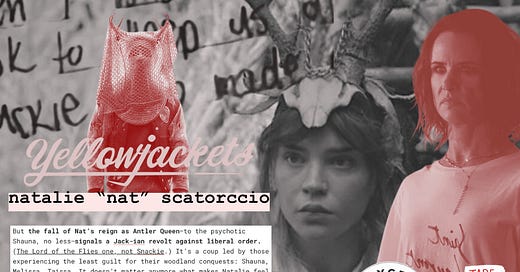



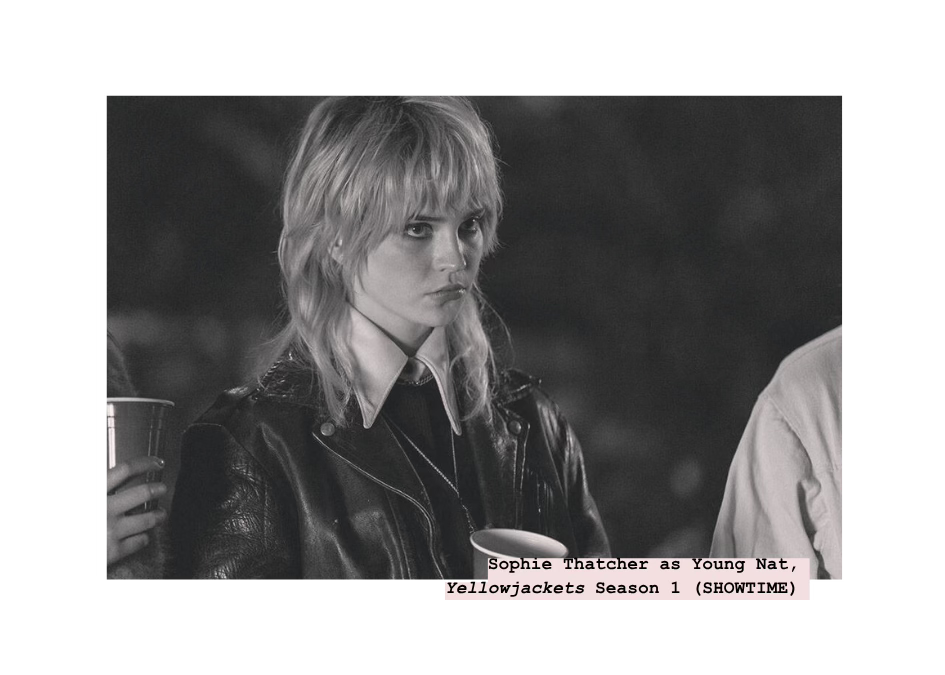

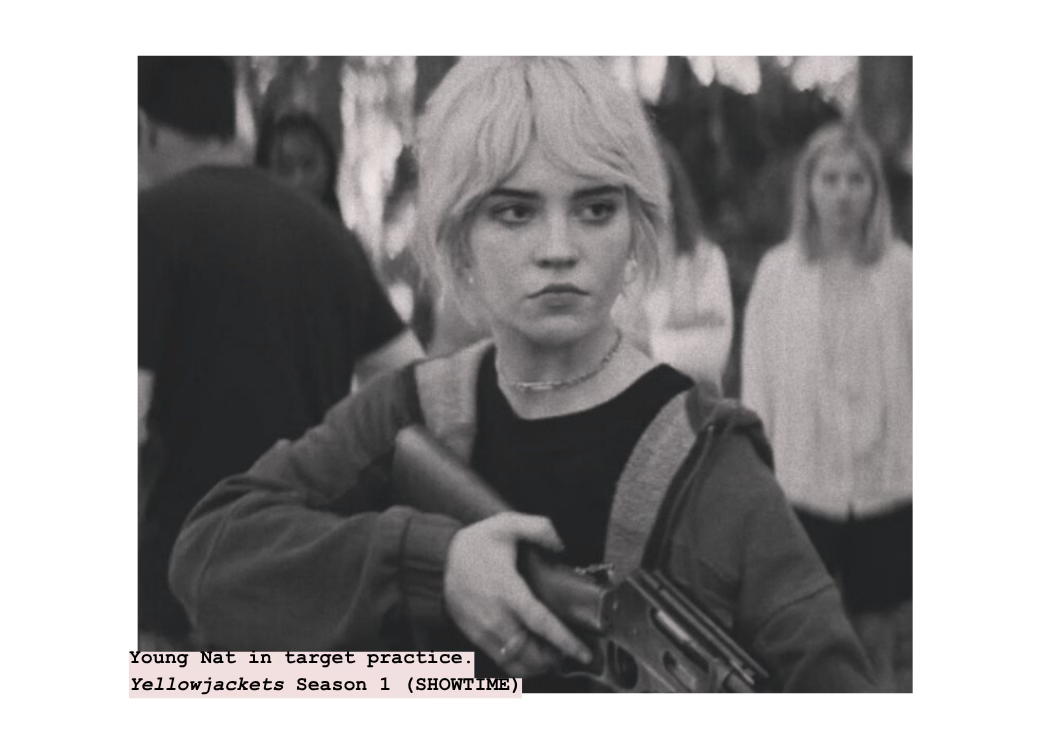

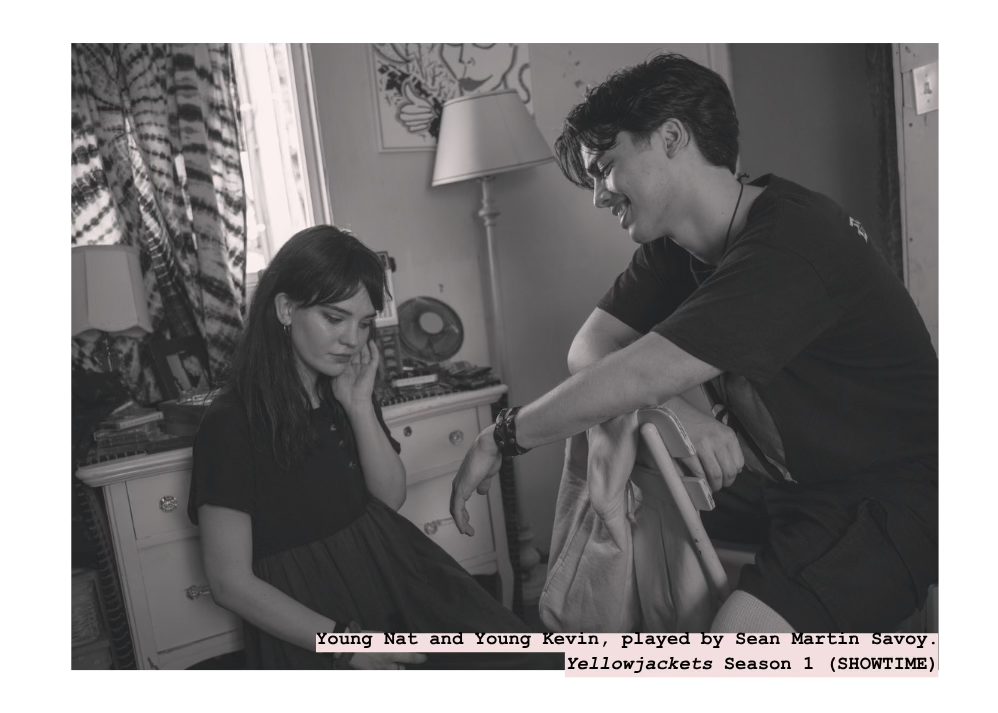
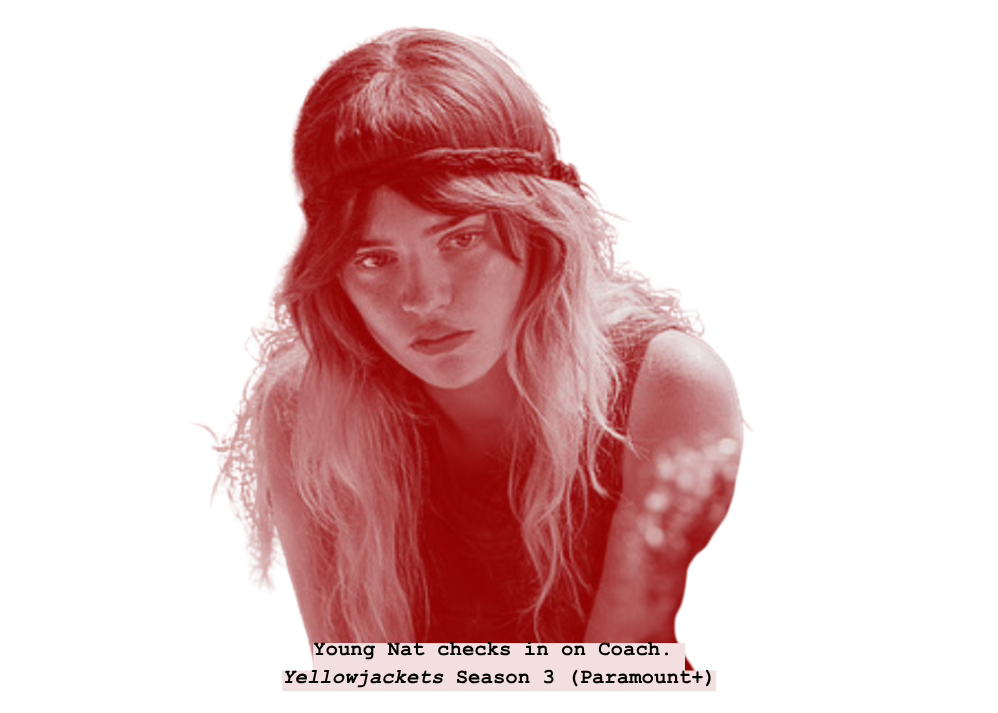
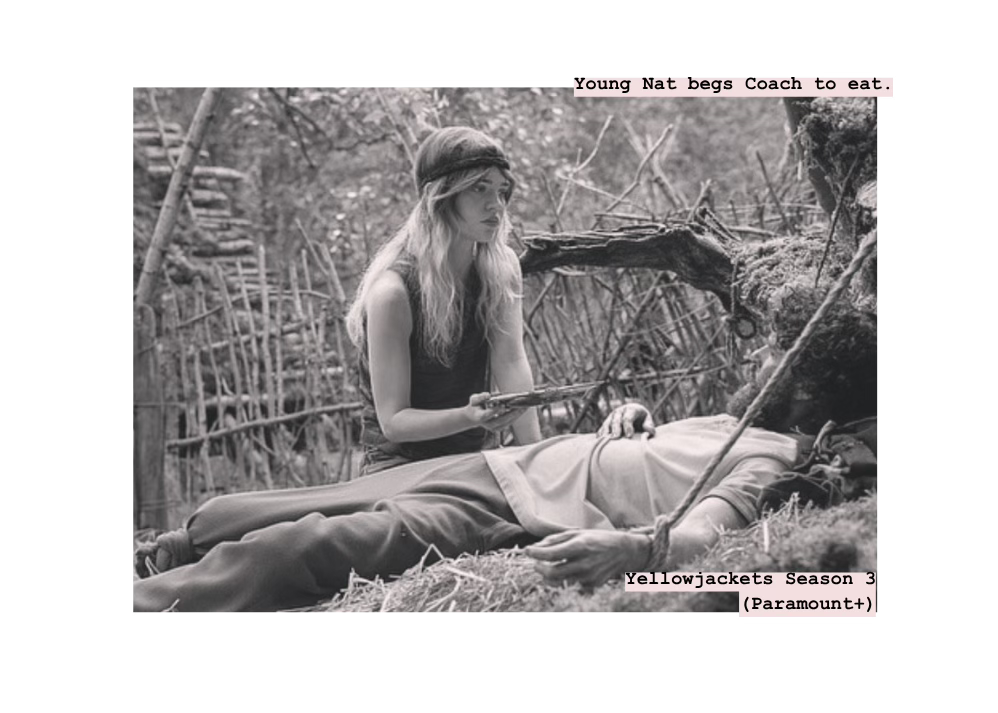
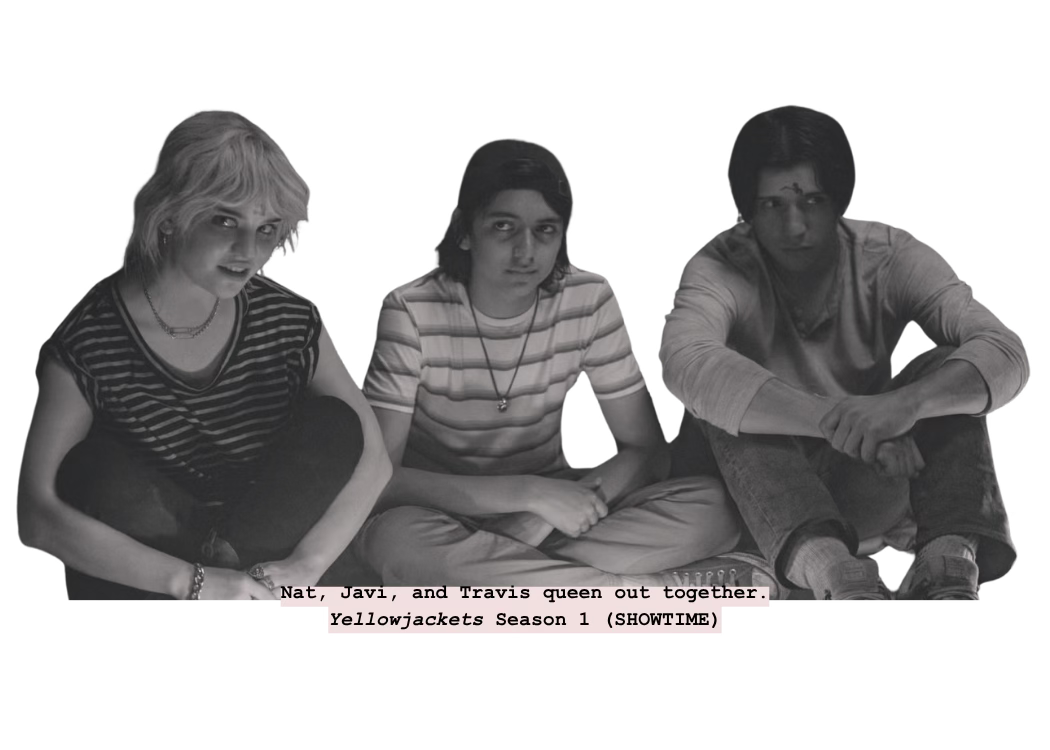








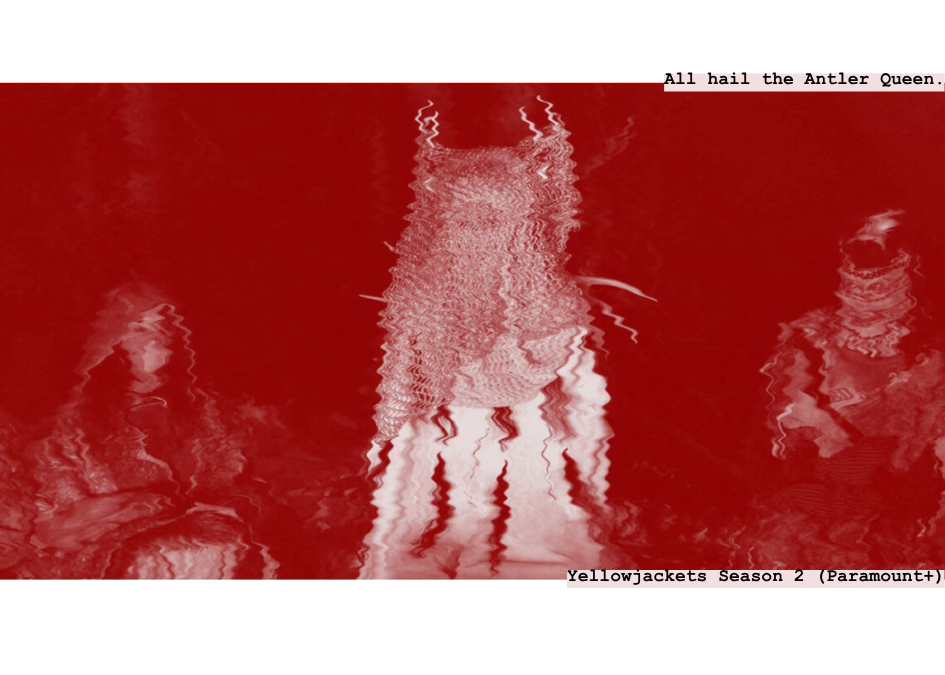


this is FANTASTIC. nat is my favorite character for a reason and you analyzed her so well. i love reading your yellowjackets posts.
It perfectly reframes Natalie as the show's moral centre rather than its chaos agent. While everyone else is pointing to her eyeliner and assuming she's the troublemaker, she's actually the one desperately trying to impose order on a situation that keeps spiralling into Lord of the Flies territory.